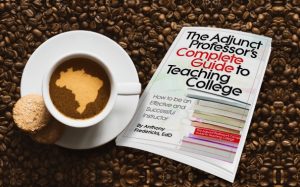Mind Matters
An Occasional Column by Anthony D. Fredericks
How to Become a Successful Adjunct Professor
 Your effectiveness as an adjunct professor is dependent on much more than your knowledge of your specific discipline. In fact, your success will be driven by characteristics and dynamics that are as much a part of who you are as they are of your classroom instruction.
Your effectiveness as an adjunct professor is dependent on much more than your knowledge of your specific discipline. In fact, your success will be driven by characteristics and dynamics that are as much a part of who you are as they are of your classroom instruction.
Conversations with scores of post-secondary colleagues around the country indicate that good adjuncts are effective because of the interaction of five distinguishing characteristics:
- Individual accountability
- Student orientation
- A critical learning environment
- Constructivist orientation
- Learning as a lifelong process
I invite you to consider these characteristics in terms of your own personality dynamics as well as in terms of your reasons for becoming an adjunct professor.
- Individual Accountability
The reasons you are an adjunct instructor are undoubtedly many. Who you are as a person and how you would like to share your knowledge with college students are significant determinants in why your chose this position. So too, will they be significant in terms of your success in the classroom. My own experiences with fellow college teachers has taught me that the personality of a teacher is a major and predominant factor in the success of students within that teacher’s influence. Here are some factors to consider:
- Learn the Culture. Your success in the classroom may be determined by how much you know about the institution(s) at which you teach. Learn the culture of the institution – every college has its own unique set of traditions, customs and practices. At the very least, you should be aware of 1) the mission of the institution, 2) the long-range plans of the institution, and 3) the core values that shape the daily life of the institution.
- Connect with Your Department. In your role as an adjunct professor, it is quite easy to feel “out of touch” with the institution as well as with the members of the department in which you are teaching. Working to establish and maintain good relationships with department members can go a long way towards ensuring success – both in the classroom and outside. Consider the following: 1) Whenever possible, talk with members of the department (full-time and part-time) in a variety of informal conversations. Talk about the weather, a recent political situation, or the status of students. 2) Ask if you can attend department meetings (if your schedule allows). Listen to the various topics and challenges under discussion. If allowed, volunteer your views and perspectives.
- Get a Mentor. One of the most effective ways you can help yourself both as a teacher and as a colleague is to find someone who is willing to act as your mentor. Not only can a mentor keep you up-to-date on classroom procedures and institutional policies, that individual can also help you feel more comfortable in the academic community. Here are some ideas to consider:
- Student Orientation
If you were to walk into the classroom of any outstanding college instructor, irrespective of her or his discipline or experience, one thing will become immediately clear: students are respected, trusted and honored. These are classrooms where the professor is not lecturing from atop a marble pedestal, but rather down interacting on a personal level with students.
Students need to know that they will never be embarrassed or ridiculed. Nor will they be intimidated or shown excessive favoritism. The best teachers are those who have positive attitudes about everyone in course. High expectations abound for each and every student and successful teachers create a learning environment in which those expectations can be realized.
Good college teachers are listeners. Good teachers know that students have much to contribute to the curriculum and to each other and provide numerous opportunities for them to do so. Or as a colleague once told me, “Good teaching often means opening your ears and closing your mouth!” Another colleague put it this way: “The connection between students and the teacher is what makes a good class. Professors should always be looking for relationships between events in students’ lives and the course content. The event may be family, work, weekend parties, world news or a campus function. Strive to make the connection and you can always make an impact.”
- Critical Learning Environment
Good adjunct professors “pepper” each class with an array of higher-level questions that help students apply, analyze, synthesize, and evaluate content. They use questions to arouse curiosity, stimulate thinking and engage students in an active model of discovery. Rather than falling into traditional models of teaching in which all the answers are provided, effective professors make good questioning their instructional priority. In short, knowledge is never static, rather it is the dynamic process coupled with knowledge that makes lessons productive and intellectually stimulating.
Good teachers provide opportunities for students to generate their own questions for discovery. However, instead of falling into the trap of providing answers to those self-initiated queries, effective teachers help students discover the answers for themselves. Self-discovery has more lasting implications and effects than simply telling students the answers.
teachers help students discover the answers for themselves. Self-discovery has more lasting implications and effects than simply telling students the answers.
Good professors provide opportunities for students to relate the content to their personal lives. Having a “head full of facts” is considerably less important than the ability to use that information to solve problems in one’s personal or professional life. Good teachers ask students to draw their own conclusions and to defend the choices they make.
- Constructivist Orientation
Good adjunct instructors enjoin students in a process of discovery, exploration and inquiry. They eschew a transmission model of teaching – one in which students are merely vessels into which the professor pours all her or his vast amounts of knowledge. Rather, good teachers embrace a teaching model that provides students with responsibilities, challenges and a measure of self-determination.
Good teachers know that learning is not simply the accumulation of knowledge (which is passive), but rather how we make sense of knowledge. Constructivism recognizes that knowledge is created in the mind of the learner. Professors help students relate new content to the knowledge they already know. In addition, students have opportunities to process and apply that knowledge in meaningful situations (sometimes called “hands-on, minds-on” learning).
Good adjunct professors promote the idea that knowledge is never a product, rather it is a process. How we learn is intrinsically more important than what we learn. For college students, this is a critical factor in the academic success children they enjoy in a course as well as the intellectual experiences they can carry with them well after their course is over.
- Learning as a Lifelong Process
Good adjunct professors are those who keep learning, those who continually add to their knowledge base throughout their teaching career. My lifelong motto has always been: “Good teachers have as much to learn as they do to teach.” Your education doesn’t stop just because you have a graduate degree. It means that if you are to provide the best possible education for your students, then you need to provide yourself with a variety of lifelong learning opportunities, too.
Good adjuncts keep current, stay active, and continually seek out new answers or new questions for exploration. Your desire to find out more about effective teaching methods and dynamic new discoveries within your field can add immeasurably to your talents as a teacher and can also add to your students’ appreciation of your discipline in their own lives.
Your success as an adjunct professor can be ensured when you consider and plan long term goals. Whether you are teaching one course at a single college or a multiplicity of courses at several institutions, you need to devote some time to “career planning” strategies that will continue to enhance your teaching effectiveness as well as your personal growth and development as a college instructor.
_____________________
 Dr. Anthony D. Fredericks is Professor Emeritus of Education at York College of Pennsylvania (and a former adjunct professor). He is an award-winning author of 175+ books, including The Adjunct Professor’s Complete Guide to Teaching College (“It literally had everything you could possibly want to know [and] is written in realistic and relatable terms!” (5-star review)
Dr. Anthony D. Fredericks is Professor Emeritus of Education at York College of Pennsylvania (and a former adjunct professor). He is an award-winning author of 175+ books, including The Adjunct Professor’s Complete Guide to Teaching College (“It literally had everything you could possibly want to know [and] is written in realistic and relatable terms!” (5-star review)

